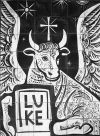
The Gospel of Luke
Greed: Lk 12,13-34
The Fool: Lk 12,13-21
Jesus now responds to a query from someone in the crowd. Deuteronomy 21,17 suggests that the first born gets a double portion of the estate.
Jesus now avoids the proposal, getting involved would not be wise. Moses' intervention in Exodus 2,14 meant he had to flee. The point is picked up by Stephen in Acts with some irony (Acts 7,35).
Jesus then speaks to "them" in verse 15. As mentioned in the overview, this would refer back to 12,1 and the disciples while not excluding the crowd who are in the background.
The last chapter of the first letter to Timothy also spells out the right attitudes towards wealth and behaviour.
The man's attitude in the story is very self centred: "I" and "my" are the dominant pronouns. He is unable to look beyond himself and his needs as he sees them.
For God, therefore, the man is a fool, the opposite to wise. Proverbs 1,7 is the classic statement: the fear of the Lord (the right attitude) is the beginning of wisdom. The fool by contrast despise wisdom and instruction.
Verse 20 then touches on the fundamental meaning of life.
The mention of treasure in verse 21 points forward to verse 34 and indicates where true treasure lies.
Now return to the main page.
Teaching: Lk 12,22-34
Jesus now speaks specifically to his disciples but his word "therefore" in verse 22 indicates a development of the theme of possessions.
The three themes are: do not worry (verse 22), do not seek (verse 29) and do not be afraid (verse 32).
Do not worry: the examples from nature are how God looks after ravens (unclean birds, Lev 11,15) and lilies. God feeds them, clothes them - so too he will care for those of little faith, an expression more characteristic of Matthew than Luke.
Do not seek (verse 29) then follows, or, rather, seek the kingdom of God (verse 32). To live in the kingdom of God is to live under his protection and his guidance.
Finally, do not be afraid (verse 32) and they are called a little flock, recalling Ezekile 34. The Father has given the kingdom, his protection and guidance, the disciples live by the gracious gift of God, under his rule (Apoc 1,6).
In consequence, they can give alms (11,41) and store up true treasure (verse 34, following on from verse 21).
We can return to the main page.
The Sunday Gospel
The Preacher of Ecclesiastes casts a decidely sceptical view over life: what is it all about, is it more than vanity. As such, he has an important role in the Bible, as he asks the deeply human questions about our world. Often that is where we must start from, even if the final conclusion is hardly surprising: fear God and keep his commandments (Eccl 12,13-14).
Qoheleth therefore gives us an appropriate background for this Gospel where the rich man is called "fool" by God (12,20). We have seen how this is the opposite to wisdom (Prov 1,7). Verse 20 in the Gospel also raises the question of the Preacher.
Unusually on this Sunday there is also a direct link between the NT reading and the Gospel: both refer to greed (or avarice in the Jerusalem Bible Gospel) (Col 3,5; Lk 12,15). In view of the Gospel reading, the emphasis on greed as idolatry in Colossians is striking.
we can return to the main page to continue our reading of Jesus'teachings to his disciples.
